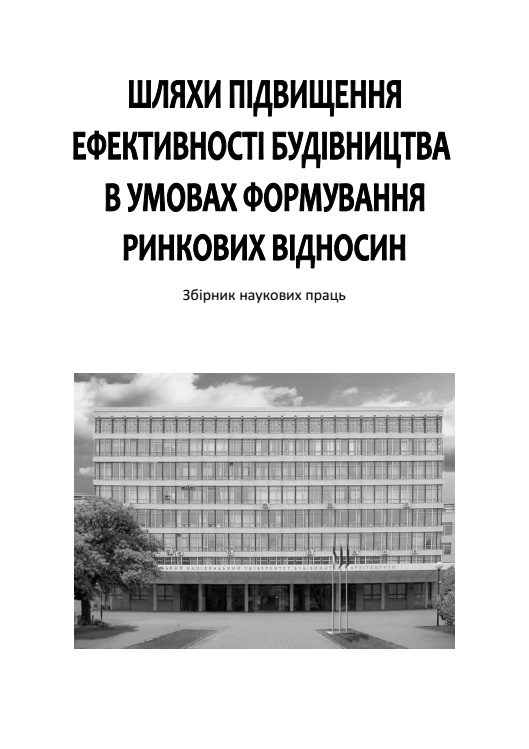Theoretical aspects of the management of building projects on the principles of "GREEN ECONOMICS"
DOI:
https://doi.org/10.32347/2707-501x.2019.40.94-102Keywords:
management, construction, "Green economics"Abstract
On the basis of theoretical analysis, the concept, principles, characteristics of the "green" economy, mentioned in various scientific publications, are generalized in the article. According to the results of the study, we propose to define the "green" economy as a model of economic development, based on sustainable development, a comprehensive approach to the process of making managerial decisions, improving the quality of life in the use of new technologies and innovations. In order to implement construction projects on the basis of the "green" economy, principles are proposed that take into account all aspects of sustainable development, as well as take into account the peculiarities of the institutional environment for the implementation of the construction project, the issue of integration and international cooperation.
References
Timothy, J and Guarnieri (2008). The Real Cost of Sustainable Development // AACE International Transactions. p. 1—7.
Lockwood C (2006). Building the Green Way // Harvard Business Publishing. p. 129—135.
Amanjeet Singh, Matt Syal, Sue C. Grady, Sinem Korkmaz (2010). Effects of Green Buildings on Employee Health and Productivity // Am J Public Health. p. 1665—1668.
Ya. Roderick, David McEwan, Craig Wheatley and Carlos Alonso (2010). A comparative study of building energy performance // Building simulation. p. 1167—1176.
Alexia Nalewaik and Valerie Venters (2008). Costs and Benefi ts of Green Building // AACE International Transactions. p. 248—256.
The Road to Rio+20: For a Developmentled Green Economy. Second issue / ed. C. M. Simpson. – New York, Geneva : United Nation, 2011. – 98 p.
The Road to Rio+20: For a Development-led Green Economy. Third issue / S. Cullis-Suzuki [et al.]. – New York, Geneva : United Nation, 2012. – 89 p.
The Transition to a Green Economy: Benefits, Challenges and Risks from a Sustainable Development Perspective : report by a panel of experts to second preparatory committee meeting for United Nations conf. on sustainable development / J. A. Ocampo, R. A. Cosbey, M. Khor (2010). – New York, Geneva : United Nation [et al.]. – 97 p.
Why a Green Economy Matters for the Least Developed Countries. – Nairobi, Kenya : United Nations Environment Programme (UNEP), 2011. – 27 p.
Maksimov, A.S. Vakhovich, I.V. Gutnichenko, T.P. Babicheva, P.Ya. Vakulenko, N.M. Tsyfra, T.Yu. and other (2015), Enerhoefektyvnistʹ v munitsypalʹnomu sektori [Energy efficiency in the municipal sector], Association of Ukrainian Cities under the USAID DIALOGUE Project, Kyiv, Ukraine.
Marchuk, T. Ryzhakov, D. Ryzhakova, G. and Stetsenko, S. (2017), “Identification of the basic elements of the innovation-analitical platform for energy efficiency in project financing”, Investment Management and Finansial Innovation, vol. 14, p. 12 -20.
Bielienkova, O.Y. Tsyfra, T.Yu. Matsapura, O.V. and Ostapenko, I.O. (2018), “Economic assessment of energy efficiency measures”, Shliakhy pidvyschennia efektyvnosti budivnytstva v umovakh formuvannia rynkovykh vidnosyn, vol. 36/2, pp. 78-82.
Downloads
How to Cite
Issue
Section
License

This work is licensed under a Creative Commons Attribution 4.0 International License.
Authors who publish with this journal agree to the following terms:
- Authors retain copyright and grant the journal right of first publication with the work simultaneously licensed under a Creative Commons Attribution License that allows others to share the work with an acknowledgement of the work's authorship and initial publication in this journal.
- Authors are able to enter into separate, additional contractual arrangements for the non-exclusive distribution of the journal's published version of the work (e.g., post it to an institutional repository or publish it in a book), with an acknowledgement of its initial publication in this journal.
- Authors are permitted and encouraged to post their work online (e.g., in institutional repositories or on their website) prior to and during the submission process, as it can lead to productive exchanges, as well as earlier and greater citation of published work (See The Effect of Open Access).

